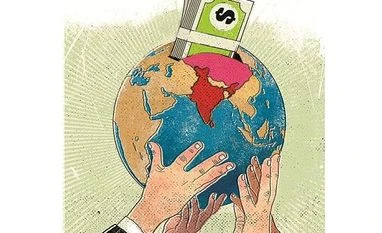More Indian CEOs are confident about the global economy than their country's, according to a survey by consultancy firm KPMG.
As per the fourth annual KPMG CEO Outlook report, two-thirds of Indian CEOs consider that a return to territorialism in different parts of the globe is a threat to their business.
The report, based on the inputs of over 125 Indian CEOs, said "89 per cent of them expressed confidence in the global economy, while only 69 per cent seemed optimistic about the growth of the Indian economy".
They have expressed greater confidence in the global economy and see emerging markets as the biggest priority for geographic expansion, it said.
"Regardless of the dip in confidence in the country's economy, CEOs are still optimistic about the short and mid-term growth of the sectors their organisations operate in," it said.
The KPMG report said however that when it comes to foraying into developed markets they are treading cautiously due to geopolitical volatility.
The increasing protectionism, specially in erstwhile bastions of free enterprise, has led 36 per cent CEOs to become cautious about geographic expansion in developed countries.
More From This Section
KPMG India Chairman and CEO Arun M Kumar said despite their overall optimism, CEOs in India are treading cautiously as they need to respond and be ready for an ever-expanding range of complex challenges and growing pains.
"Two-thirds (66 per cent) of business leaders surveyed in India identified return to territorialism as a threat to their organisation's growth," he said.
The findings come at a time when the global trade order is facing a shift, specially after the US announced imposing of tariffs on many products from different countries, including China and India along with Europe.
"Enhanced protectionism has been a recent trend across the world, especially in places which were erstwhile bastions of free enterprise," KPMG India Partner and Head Tax Hitesh D Gajaria said.
CEOs need to adapt to the globalising economy and also be aware of tax and regulatory changes that are counter-intuitive to it, he added.
Pertinent to note is, global territorial dynamics have now started to impact CEO strategies in specific geographies, the report said.
To mitigate this territorial risk, that 62 per cent CEOs are showing business confidence in emerging markets over developed markets to drive future growth, it added.
Under emerging markets, with 28 per cent votes, Central/ South America has emerged as the most trusted region for expansion for CEOs in India. This is followed by Eastern Europe (27 per cent) and Africa (21 per cent).
Interestingly, the CEOs saw Brexit as an opportunity to expand their operations in the UK with 42 per cent of CEOs of companies with no operations in the country likely to make inbound investments there or 32 per cent stating that they might increase level of trade with the UK.
"Some are likely to move their headquarters or operations to the UK while others are planning to hire new talent in the UK," the report added.
This data indicates that a majority of CEOs are upbeat about growth of the global economy, and are therefore likely to include global diversification in their market strategy.
The report is based on the inputs of over 125 Indian CEOs, who participated in a global survey conducted by KPMG International in which 1,300 global CEOs from Australia, China, France, Germany, Italy, Japan, the Netherlands, Spain, the U.K. and the US took part.
The survey was done between January-February 2018 and the forecasts made are for a three year period, KPMG India said.
)